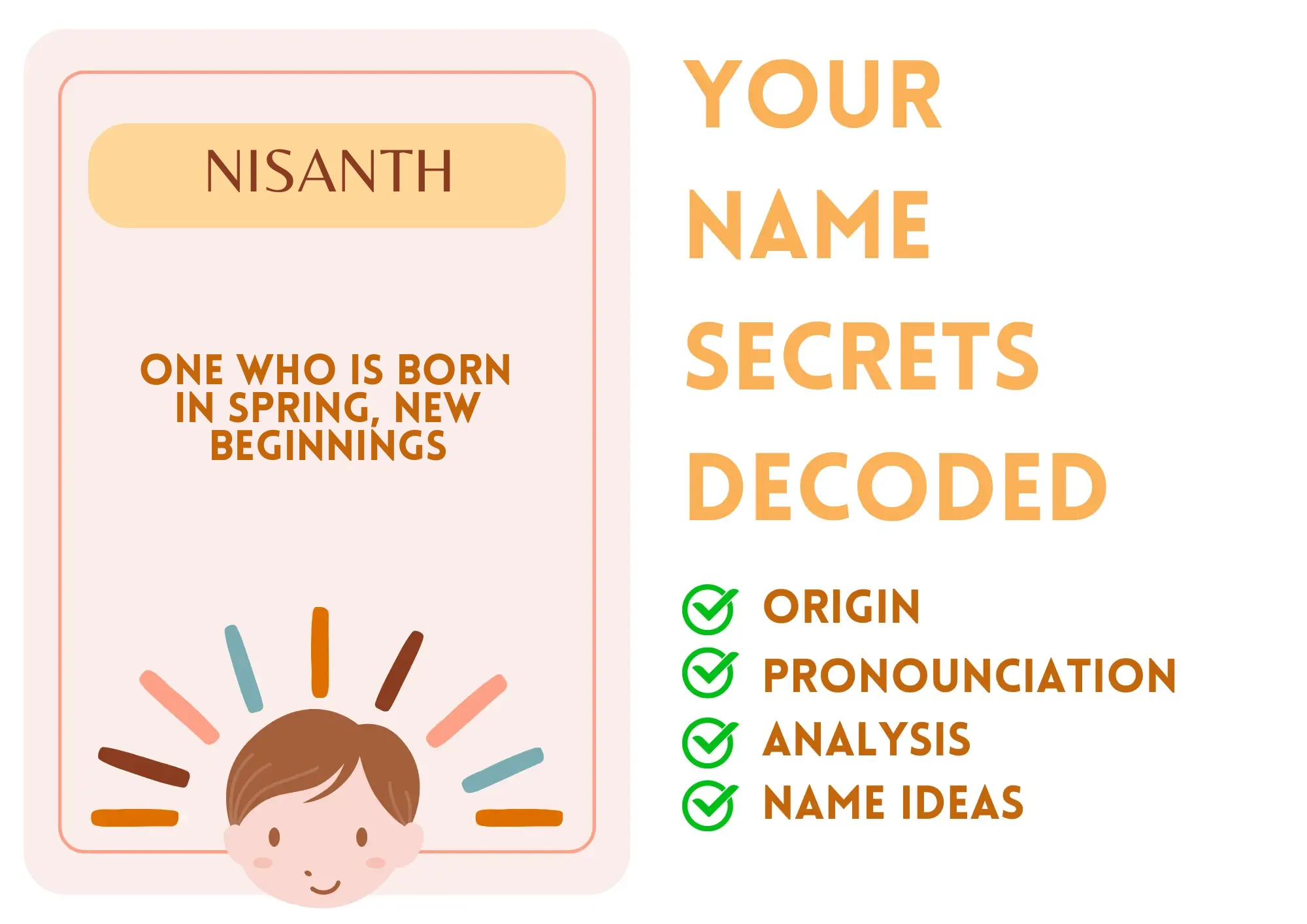
Nisanth
Nisanth is a distinctive name with Indian origins that signifies 'one who is born in spring' or 'new beginnings'. It is primarily used in India and carries a masculine connotation, although it can also be seen as unisex. The name is notably connected to the Thyagaraja and Carnatic music traditions, enhancing its cultural importance in South India.
Nisanth is associated with positive traits such as renewal, growth, and vibrancy, which often resonates with the qualities of springtime. It is commonly appreciated for its unique sound and meaning.
This name finds its footing in contemporary culture, often conveying a bright, optimistic character. Parents choose Nisanth for its deep roots in Indian culture and its uplifting connotations.
Basic Information
Gender: Boy
Sounds Like: nee-santh
Pronunciation Explanation: The first syllable 'nee' rhymes with 'bee', and the second syllable 'santh' sounds like 'sant'.
Summary and Meaning
Meaning: one who is born in spring, new beginnings
Origin: The name Nisanth has Indian origins, rooted in Sanskrit and commonly used in Hindu culture.
Usage: Nisanth is traditionally recognized as a masculine name but can be considered unisex in modern contexts.
Name Number (Chaldean)
Name Number (Pythagorean)
Name Constellation (Nakshatra)
Name Zodiac Sign (Rashi)
Popularity (Global Rank)
Overall: 42654
Boys: 27753
Most Popular in
Religious and Cultural Significance
Religion: Hindu
Background: In Hindu culture, spring represents rejuvenation and freshness, aligning with the symbolic meaning of Nisanth.
Cultural Significance: Nisanth is valued for its reflective association with spring and is often chosen as a name that conveys hope and new beginnings.
Historical Significance: Nisanth is less prominent in historical texts but embodies themes of renewal and life associated with spring in various cultural narratives. Its literary and musical connotations further enhance its significance in traditional arts.
Popular Culture
Literature and Mythology: While not commonly referenced in ancient texts, names with similar meanings represent re-birth or rejuvenation in various literary traditions.
Movies and Television: Characters named Nisanth are less common, but names indicative of springs, like Nisanth, may appear in modern Indian cinema and shows symbolizing growth or new life.
Feelings and Perceptions
Perception: Nisanth is generally perceived positively, embodying the essence of growth, freshness, and positivity. It is considered unique and carries an artistic flair.
Positive Feelings: Vibrant, hopeful, unique, original, refreshing.
Negative Feelings: Might be perceived as unfamiliar to those outside the cultural context.
Practical Considerations
Ease of Writing and Calling: Nisanth is moderately easy to write and pronounce. It consists of seven letters and two syllables, making it memorable yet distinctive.
Common Typos and Misspellings: Nisath,Nisanthh,Nisanth,Nisanth
Common Nicknames: Nisi,Santh,Nis
Nisanth Popularity
Nisanth Usage and Popularity By Country
| Country | Rank (Overall) |
|---|---|
| Bahrain | 2991 |
| Oman | 4748 |
| Qatar | 5198 |
| United Arab Emirates | 6226 |
| India | 10261 |
| Uganda | 20326 |
| Russia | 23691 |
| Ireland | 23749 |
| Sri Lanka | 29200 |
| Australia | 32609 |
Nisanth Usage and Popularity By City
| City | Rank (Overall) |
|---|---|
| Thiruvananthapuram | 907 |
| Chennai | 6084 |
| Bengaluru | 9633 |
| Thrissur | 985 |
| ErnÄkulam | 2228 |
| Palakkad | 697 |
| Bengaluru | 18805 |
| Bangalore | 6160 |
| HyderÄbÄd | 15967 |
| Kozhikode | 1584 |
Compatibility Analysis
Famous Persons Named Nisanth
No results found for Nisanth.
Related Names
Similar Sounding Names:
Nishant,Nivaan,Niranjan,Ananth